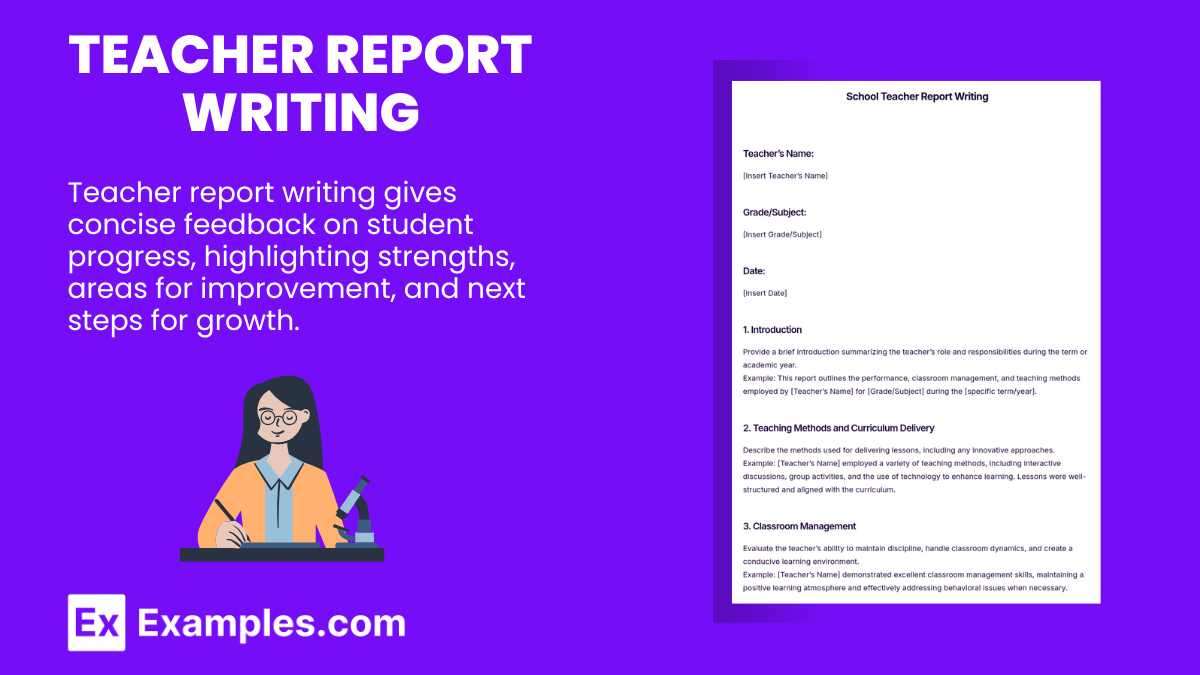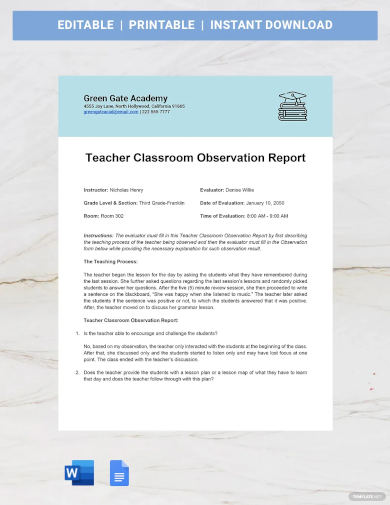Many may assume if you have already outgrown school or have graduated from school that you can escape reports. Unfortunately, that is not the case in any way. But it does not mean that this is considered a bad thing either. In a way, school taught you how to write reports of any kind, so in the real world, you would not have any issues whatsoever when it comes to reports. Whether you are a police officer, an employee in a company, an intern in an organization or a teacher or basically anyone, you would always encounter one or more reports.
To make it as frank as possible, you cannot avoid writing or filling out reports. For whatever reason, reports are always important one way or the other. For teachers, report writing is essential. As this is one of the ways to show that their students progress to their parents. In addition to that, report writing can also be used for teacher’s personal research for their class or for a higher educational purpose. For teachers out there, how do you explain your report writing to a parent?
What is Teacher Report Writing?

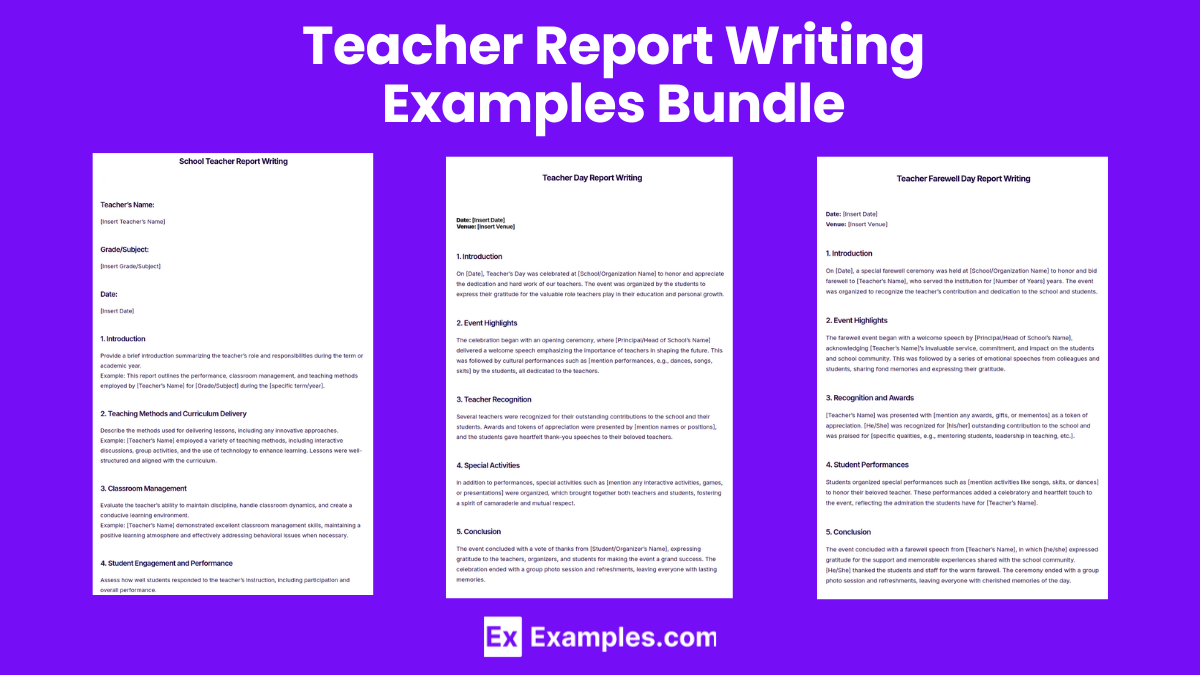
Download Teacher Report Writing Bundle
Teacher Report Writing Format
Opening Remarks
- Greeting: Begin with a warm and respectful greeting.
- Example: “Good morning/afternoon, everyone,” or “Ladies and gentlemen,”
Introduction
- Purpose: Briefly state the purpose of your speech.
- Example: “I stand before you today to express our sincere gratitude to all those who have contributed to the success of this academic year.”
Acknowledgments
School Administration
- Recognition: Thank the school administration for their guidance and support.
- Example: “First and foremost, I would like to thank the school administration for their unwavering support and leadership throughout the year.”
Teachers
- Appreciation: Acknowledge the hard work and dedication of the teaching staff.
- Example: “Our heartfelt thanks to the teachers who have worked tirelessly to educate and guide our students.”
Parents
- Gratitude: Show appreciation to the parents for their cooperation and support.
- Example: “We are truly grateful to the parents for their ongoing support and trust in our educational efforts.”
Students
- Acknowledgment: Thank the students for their hard work and enthusiasm throughout the year.
- Example: “A big thank you to our students for their commitment to learning and making this year a success.”
Support Staff
- Appreciation: Recognize the efforts of the support staff and administration for ensuring smooth operations.
- Example: “We also extend our gratitude to the support staff for their behind-the-scenes efforts that ensured everything ran smoothly throughout the year.”
Closing Remarks
- Summarize: Briefly recap the key points of gratitude.
- Example: “In conclusion, we are deeply grateful to everyone who has played a part in making this academic year successful and fulfilling.”
Farewell
- Goodbye: End with a polite farewell.
- Example: “Wishing everyone continued success and a great year ahead.”
School Teacher Report Writing
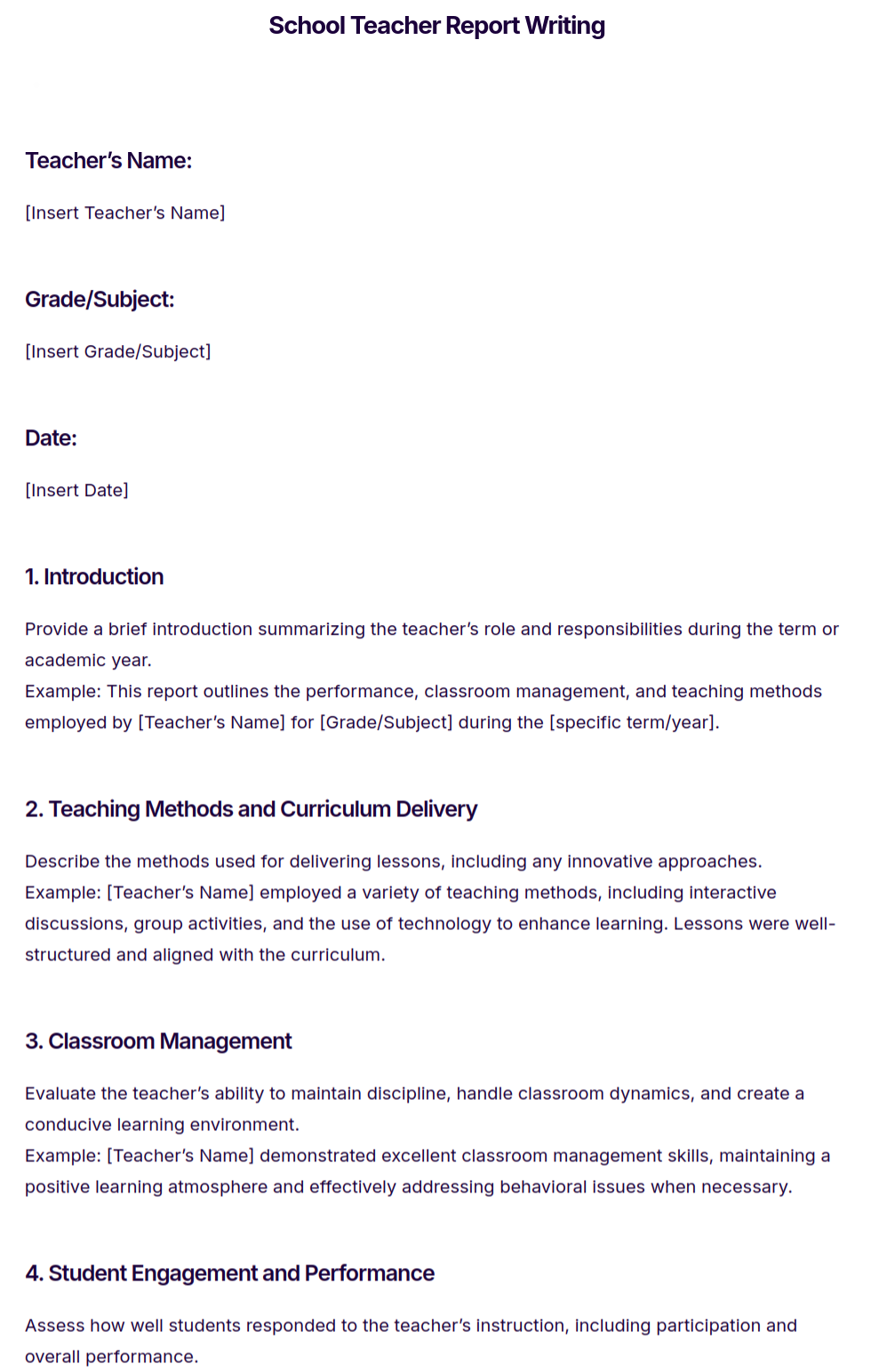
Teacher Day Report Writing
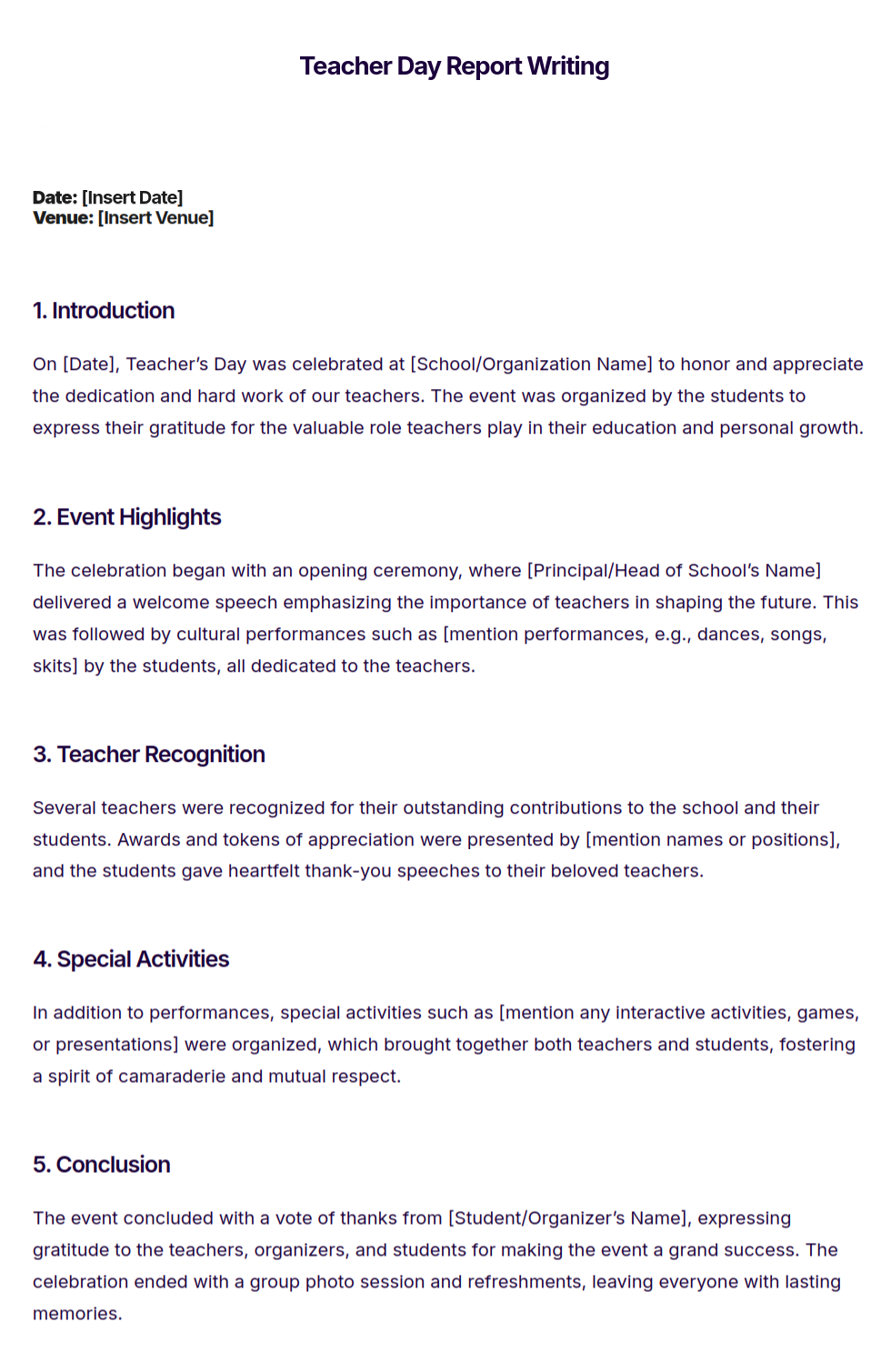
Teacher Farewell Day Report Writing

More Teacher Report Writing Examples and Samples
- Teacher Report Writing in Primary School
Teacher Report Writing in High School
Teacher Report Writing for Participation and Social Skills
6+ Teacher Report Writing Examples
1. Teacher Classroom Observation Report Template
2. Sample Teacher Research Report Writing
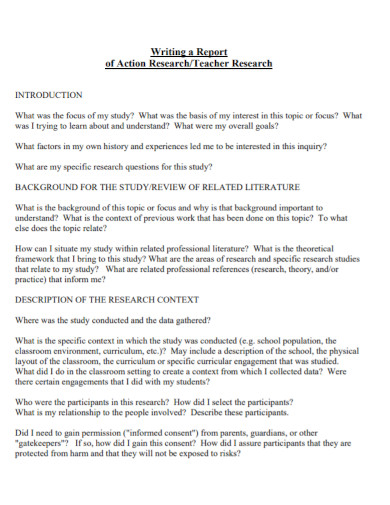
3. Teacher Writing Report Card
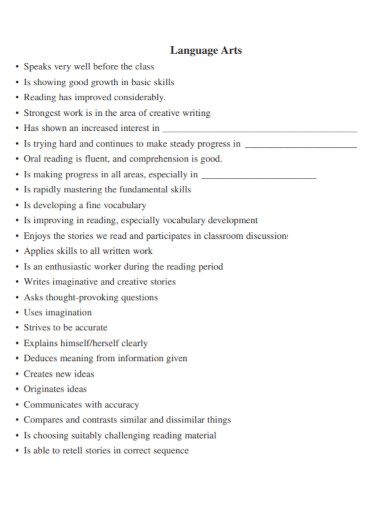
4. Teacher Writing Training Report
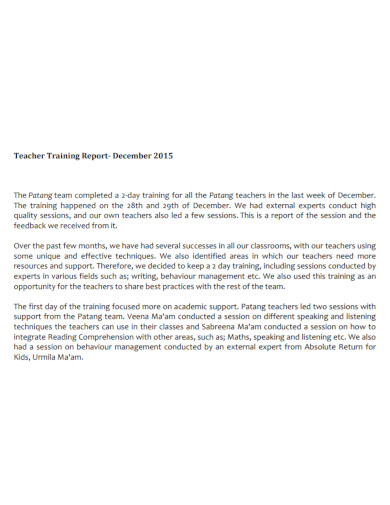
5. Professional Teacher Report Writing
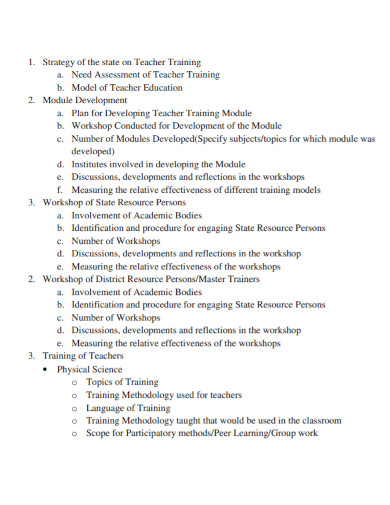
6. Formal Teacher Report Writing
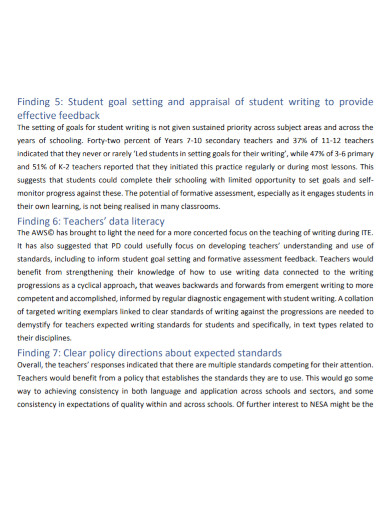
7. Classroom Teacher Report Writing
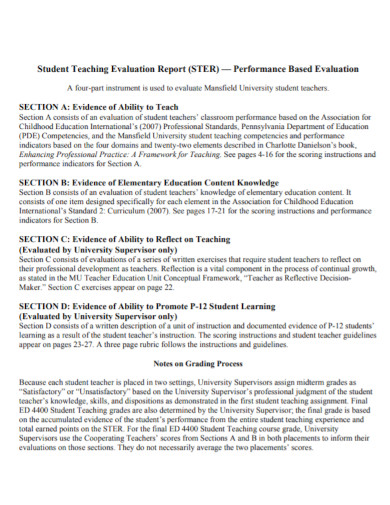
How to Write Teacher Report Writing?
1. Begin with Basic Information
Start with the teacher’s name, grade/subject, and the date.
Example:
- Teacher’s Name: Mr. John Smith
- Grade/Subject: 8th Grade, Mathematics
- Date: October 9, 2024
2. Introduction
Provide an overview of the teacher’s performance and the purpose of the report. Mention the duration of observation, if applicable, and any specific objectives for writing the report.
Example:
This report highlights Mr. John Smith’s performance and contributions during the academic year. It assesses his teaching methods, classroom management, and overall impact on student achievement.
3. Teaching Effectiveness
Evaluate the teacher’s methods and strategies for delivering the curriculum. Mention how well the teacher engages students and the effectiveness of their teaching practices.
Example:
Mr. Smith employs a variety of teaching techniques, such as interactive activities and problem-solving sessions, to keep students engaged. His lessons are well-organized, and he effectively integrates technology into his instruction.
4. Classroom Management
Assess the teacher’s ability to maintain discipline and a conducive learning environment. Comment on how well they handle classroom dynamics and manage student behavior.
Example:
Mr. Smith maintains excellent classroom discipline. He sets clear expectations for behavior and uses positive reinforcement to encourage student participation and focus.
5. Student Progress and Achievement
Describe how the teacher contributes to student learning and academic growth. Mention any specific improvements or challenges students have faced under the teacher’s guidance.
Example:
Students in Mr. Smith’s class show steady progress in mathematics. His individualized attention to struggling students has significantly improved their performance in tests and quizzes.
6. Professional Development
Highlight the teacher’s commitment to improving their skills. Mention any professional development activities they’ve participated in, such as workshops or certifications.
Example:
Mr. Smith is committed to professional growth, regularly attending math education workshops and integrating new teaching methods into his lessons.
7. Collaboration and Leadership
Comment on how well the teacher collaborates with colleagues and contributes to the school community. Mention any leadership roles they may have taken on.
Example:
Mr. Smith works collaboratively with his peers, often sharing resources and strategies. He has also taken on the role of math club coordinator, helping students explore advanced topics.
8. Areas for Improvement
Offer constructive feedback on areas where the teacher can improve. Be specific but supportive, focusing on how they can enhance their performance.
Example:
While Mr. Smith is excellent at engaging students, there is room for improvement in differentiating instruction to meet the needs of advanced learners.
9. Conclusion
Summarize the overall performance of the teacher and any final observations or recommendations.
Example:
In conclusion, Mr. Smith is a dedicated educator who demonstrates strong teaching abilities, classroom management, and a commitment to student success. With minor adjustments to address the needs of all learners, he will continue to be an asset to the school.
Tips for Teacher Report Writing
1. Start with Basic Information
Begin the report by clearly stating the teacher’s name, grade/subject, and the period being reviewed. This provides context for the reader.
2. Be Objective and Balanced
Maintain an objective tone, focusing on facts and specific examples rather than opinions. Highlight both strengths and areas for improvement to provide a well-rounded assessment.
3. Use Clear and Concise Language
Keep your language simple and concise. Avoid jargon or overly complex sentences. Make sure your points are clear and easy to understand.
4. Provide Specific Examples
Back up your observations with specific examples of the teacher’s actions. For instance, if a teacher excels in classroom management, mention a specific instance when they effectively handled a challenging situation.
5. Focus on Teaching Methods
Evaluate the teacher’s teaching strategies and methods. Consider how well the teacher engages students, delivers content, and adapts to different learning styles.
6. Assess Classroom Management
Look at how the teacher maintains order and discipline in the classroom. Effective classroom management is essential for a conducive learning environment.
7. Include Student Performance
Consider the impact of the teacher’s efforts on student progress. Discuss how students are performing under the teacher’s guidance and if any noticeable improvements have been observed.
8. Highlight Professional Development
Acknowledge the teacher’s commitment to their own growth by noting any professional development activities or workshops they’ve attended.
9. Offer Constructive Feedback
While it’s important to praise a teacher’s strengths, also provide suggestions for improvement in a supportive manner. Be specific about the areas that need enhancement and offer practical solutions.
10. End on a Positive Note
Conclude the report by summarizing the teacher’s overall performance. Highlight their contributions and express optimism about their continued success.
FAQs
1. Why is teacher report writing important?
Teacher report writing is essential for assessing the effectiveness of teaching methods, identifying areas for professional development, and ensuring quality education for students. It also provides valuable feedback to teachers to help them improve.
2. What is the purpose of Teacher Report Writing?
The purpose of teacher report writing is to assess the effectiveness of a teacher, highlight areas of strength, and provide constructive feedback for improvement. It serves as a tool for professional development and ensuring quality education for students.
3. What should be avoided in Teacher Report Writing?
In teacher report writing, avoid:
- Personal opinions or emotional language
- Generalized statements without supporting evidence
- Criticism without offering constructive solutions
- Overemphasis on minor issues while ignoring major achievements
4. How can Teacher Report Writing help in professional development?
Teacher report writing helps in professional development by providing structured feedback, identifying strengths, and offering suggestions for improvement. It encourages continuous learning and enhances teaching practices for better student outcomes.
5. How do you address areas for improvement in Teacher Report Writing?
Address areas for improvement by being specific and constructive. Identify particular teaching practices that could be enhanced and offer practical solutions or recommendations. Keep the tone supportive to encourage professional growth.
6. How does Teacher Report Writing affect student learning?
Teacher report writing indirectly affects student learning by helping teachers improve their methods and strategies, which leads to better classroom engagement and academic outcomes. Constructive feedback allows teachers to adjust and optimize their teaching.
7. How often should Teacher Report Writing be conducted?
Teacher report writing is usually conducted at the end of a term or academic year. It may also be part of regular performance evaluations, or it can be done after a specific observation period or in response to particular incidents or achievements.
8. What is the tone used in Teacher Report Writing?
The tone used in teacher report writing should be formal, professional, and objective. It should provide balanced feedback, focusing on both positive aspects and areas needing improvement, without sounding overly critical or overly complimentary.



